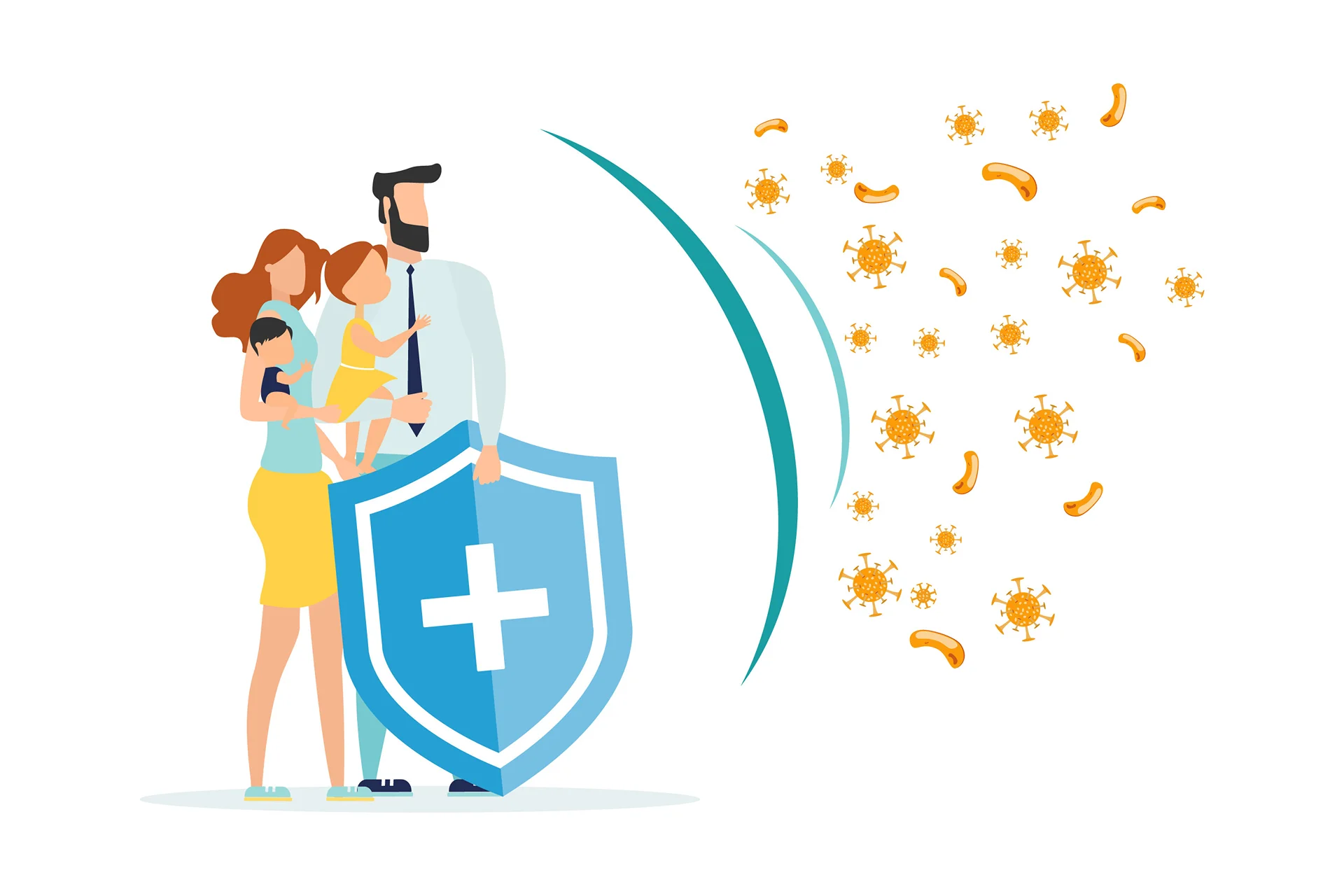In recent years, the importance of natural immunity has been overlooked in favor of medical treatments and interventions.
Natural immunity plays an integral role in maintaining good health and fighting off disease. It is therefore critical to understand why natural immunity is being ignored and how it can be addressed.
It refers to a person’s ability to protect themselves from illness or injury without the need for additional medical intervention.
This occurs when the body produces antibodies that are capable of recognizing specific pathogens such as bacteria or viruses, which then activates an immune response designed to destroy these invaders before they can cause harm.
Natural immunity also provides protection against previously encountered threats, allowing individuals to remain healthy even after exposure to certain diseases.
Unfortunately, despite its benefits, many people fail to recognize the important role that natural immunity plays in their overall wellbeing.
In this article we will explore why natural immunity is being ignored and what steps can be taken to ensure its continued recognition as a valid approach towards staying healthy.
How Natural Immunity Works
Our immune system is a complex network of cells and molecules that work together to defend us against pathogenic organisms.
Natural immunity, or infection-induced immunity, begins when the body’s natural defenses recognize an invading organism.
Upon detection, specialized T cell initiate a rapid response in order to eliminate the threat.
This process involves numerous antibodies which target pathogens and signal other components of our immune system to attack them.
The interaction between these proteins and receptors helps provide protection against future exposure to similar organisms as well as any associated secondary infections.
The power of natural immunity lies in its ability to remember past encounters with infectious agents and respond quickly upon re-exposure.
Memory T cells are key players in this process, triggering a much more potent defense than if we had not been exposed before.
Certain immunoglobulins can remain active for months or even years after initial contact with the infectious agent, providing long lasting protection from reinfection.
As such, natural infection provides a unique opportunity for our bodies to develop defenses that protect us from recurring diseases and illnesses over time.
Comparing Natural Immunity With Vaccine-Induced Immunity

Having discussed the fundamentals of natural immunity and what types of immune cells and antibodies are involved, it is now time to compare this form of acquired immunity with vaccine-induced immunity in terms of breadth, strength, and duration.
When comparing the two forms of disease controlᅳnatural immunity versus vaccine-induced immunityᅳit quickly becomes apparent that each has its own advantages and disadvantages.
| Advantages | Disadvantages | |
| Natural Immunity | Longer duration<br>Possibility for herd immunity if enough people gain protection from infection through previous exposure | Riskier as there may be no guarantee against infection or a severe reaction due to lack of information about prior exposure |
| Vaccine-Induced Immunity | Quickly generated protection after vaccination compared to natural immunity which takes weeks/months depending on severity of illness | Shorter lasting protection than natural immunity – booster doses often necessary to maintain optimal levels of protection |
In terms of breadth, both natural and vaccine-induced immunities can provide broad coverage when there is high prevalence within a population; however, these benefits will only exist where there have been sufficient exposures or vaccinations administered.
When considering strength and duration, generally speaking, natural immunities tend to last longer than those induced by vaccines.
This fact makes them more desirable for long term disease control measures such as extended outbreaks requiring sustained prevention efforts.
Why Recognizing And Respecting Natural Immunity Is Important For Public Health Policy And Individual Rights
Recognizing and respecting natural immunity is important not only from a public health perspective but also in terms of individual rights.
Adequate protection from reinfection can be conferred by either an effective vaccine or through naturally acquired immunity following exposure to the virus itself.
Natural immunity provides individuals with timely protection against disease onset or severe illness due to previous infection.
As such, it should be respected as part of any public health policy related to COVID-19 pandemic management.
Furthermore, allowing people who have previously been infected access to certain activities without restrictions would enable them their right to make decisions on their own behalf while protecting others at the same time.
The recognition and respect of natural immunity could also help mitigate some of the psychological burden associated with prolonged social distancing measures, travel restrictions and other limitations on personal freedom which many countries are still implementing in order to slow down transmission.
It may provide a sense of safety and well-being among those whose immune system has successfully responded against SARS-CoV-2 prior infection, thus empowering them towards making informed decisions about their own lives.
Avoiding Unnecessary Vaccination Risks; Reducing Vaccine Hesitancy; Promoting Informed Consent; Respecting Bodily Autonomy
Natural immunity is often overlooked in the fight against COVID-19.
The focus on mRNA vaccine has led to an emphasis on quick, efficient immunization campaigns, rather than allowing individuals to build up their own immune response naturally.
However, vaccine hesitancy should not be ignored; it could have serious consequences for public health if people are convinced not to take a vaccine but then contract severe Covid-19 due to lack of protection.
Promoting informed consent and respecting individual autonomy when considering vaccination options are important steps towards resolving this issue.
Vaccination must also be balanced with other measures such as social distancing and mask wearing where appropriate, while avoiding unnecessary risks associated with mass vaccinations programmes.
Research into natural immunity and its role in protecting against COVID-19 needs to be further explored so that the best strategies going forward can be identified.
It is essential that we understand how our bodies respond naturally to the virus and whether it is possible for us to increase our antibody responses without relying solely on artificially administered vaccines.
Doing so will allow us to make better decisions about how best to protect ourselves from this pandemic in the future.
Optimizing Resource Allocation; Preventing Discrimination; Fostering Social Cohesion
Facts of natural immunity may have been ignored in recent years when discussing public health approaches to infectious diseases.
The potential implications for optimizing resource allocation are significant; by recognizing this form of immunization, we could target populations at greatest risk and acknowledge those wishing not to vaccinate due to personal beliefs or medical pre-existing conditions.
Moreover, by acknowledging natural immunities there will no longer be any need for discrimination based on whether someone has received a vaccine or not.
We would instead create an environment wherein social cohesion is encouraged – which should ultimately lead to better outcomes regarding public health initiatives related to infectious diseases.
Raising Awareness on Natural Immunity Is Crucial
Despite the clear importance of natural immunity in mitigating the spread of infection, some think that vaccines are still the only answer.
This may be due to a lack of understanding of its benefits and potential protective immunity against emerging variants such as the delta variant.
To address this issue, focus must be placed on raising awareness among health professionals and policy makers regarding the value of natural infection.
Efforts should be made to ensure that resources are allocated towards preventive measures that can facilitate natural infection while minimizing risk.
Access to testing and healthcare provision should remain open and equitable across different socioeconomic backgrounds in order to optimize herd immunity thresholds and prevent discrimination within communities.
Conclusion
Our understanding of natural immunity should not be overlooked, but rather embraced and respected.
It can serve as a powerful tool for protecting public health.
By acknowledging herd immunity thresholds and optimizing resource allocation, we can ensure that vaccination risks are minimized while also preventing discrimination towards those with naturally acquired protection.
We must also keep in mind individual rights, such as respecting bodily autonomy and promoting informed consent.
Through fostering social cohesion, we can work together to reduce vaccine hesitancy and support the move away from unnecessary vaccinations.
Ultimately, striking this balance between avoiding risk and preserving freedom will lead us closer to achieving our collective goal: improved public health outcomes through greater recognition of natural immunity.
FAQs
What is natural immunity?
Natural immunity is the protection against a disease that results from being exposed to it naturally (i.e., without vaccination) and developing an immune response.
How long does natural immunity last?
The duration of natural immunity varies depending on several factors, such as the type of disease, the severity of infection, and individual characteristics. For COVID- 19 specifically, studies have shown that natural immunity can last at least a year after recovery12, but more research is needed to determine its exact longevity.
How does natural immunity compare with vaccine-induced immunity?
Both forms of immunity can provide protection against COVID- 19, but they may differ in their breadth (how many strains they can recognize), strength (how well they can neutralize them), duration (how long they can persist). Some studies suggest that natural immune responses are more robust diverse than vaccine-induced ones34, but more research is needed to compare them directly.
What Are Some of the Reasons Why Some People Think That Natural Immunity Is Less Effective Than Vaccines?
Here are some of the reasons why a good number of the populace believe that Natural Immunity lags behind vaccines:
- Not everyone who gets infected with COVID-19 develops protective antibodies.
- Natural immunity fades faster than vaccine immunity, especially after mild infection.
- Natural immunity alone is only half as effective as natural immunity plus vaccination.
- Vaccines provide more consistent and stronger protection against variants than natural immunity
